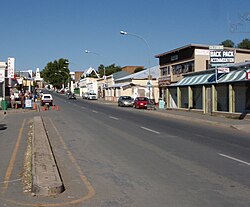Colesberg
| Colesberg | |
|---|---|

Colesberg Main Street
|
|
|
|
|
| Coordinates: 30°43′00″S 25°06′00″E / 30.71667°S 25.10000°ECoordinates: 30°43′00″S 25°06′00″E / 30.71667°S 25.10000°E | |
| Country | South Africa |
| Province | Northern Cape |
| District | Pixley ka Seme |
| Municipality | Umsobomvu |
| Established | 1830 |
| Area | |
| • Total | 174.84 km2 (67.51 sq mi) |
| Population (2011) | |
| • Total | 16,869 |
| • Density | 96/km2 (250/sq mi) |
| Racial makeup (2011) | |
| • Black African | 67.4% |
| • Coloured | 25.7% |
| • Indian/Asian | 0.6% |
| • White | 5.3% |
| • Other | 1.0% |
| First languages (2011) | |
| • Xhosa | 59.5% |
| • Afrikaans | 33.1% |
| • Sotho | 2.8% |
| • English | 1.8% |
| • Other | 2.9% |
| Postal code (street) | 9795 |
| PO box | 9795 |
| Area code | 051 |
Colesberg is a town with 17,354 inhabitants in the Northern Cape province of South Africa, located on the main N1 road from Cape Town to Johannesburg.
In a sheep-farming area spread over half-a-million hectares, greater Colesberg breeds many of the country's top merinos. It is also renowned for producing high-quality racehorses and many stud farms, including one owned by renowned golfer, Gary Player, are nearby.
Founded in 1830 on an abandoned station of the London Missionary Society, and initially named Toverberg after a nearby hill, it was renamed Colesberg after Sir Galbraith Lowry Cole, then Governor of the Cape Colony. The site of the town lay on one of the well-travelled routes used by traders, hunters and explorers to gain access to the interior. Towerberg or Coleskop is a prominent hill near the town and a landmark easily seen from a distance by travellers. Colesberg saw a large number of battles and skirmishes during the second Anglo-Boer War, and the Colesberg Garden of Remembrance is located just outside the town.
A number of 1820 Settlers established farms in the Colesberg district. Outnumbered as a religious group, some attended the Methodist Church and others the Dutch Reformed Church, where services in English were specially held for them. Anglican officials in Cape Town appointed Dr CEH Orpen as Rector and the first services were conducted in the Court House and the London Mission Chapel, which became known as St Stephen's Church. In 1852 the construction of the Anglican Christ Church was started, having been designed by Sophy Gray, wife of the Cape Town bishop Robert Gray.
The Colesberg Bank was founded in 1861. Michael Davitt wrote while documenting the Second Boer War, that the previous generation noted the village as a rendezvous for hunters and diamond miners.
...
Wikipedia



